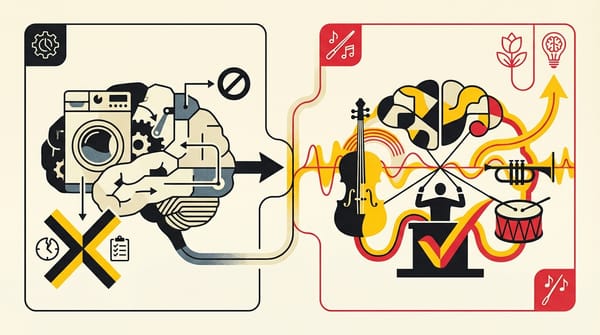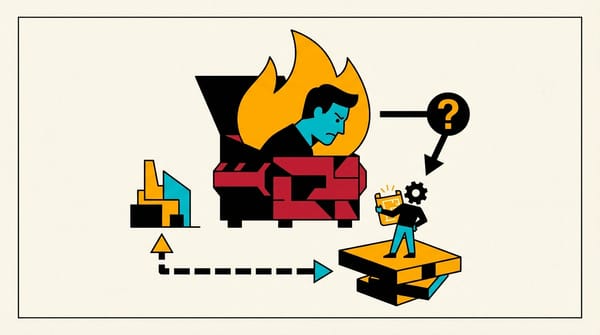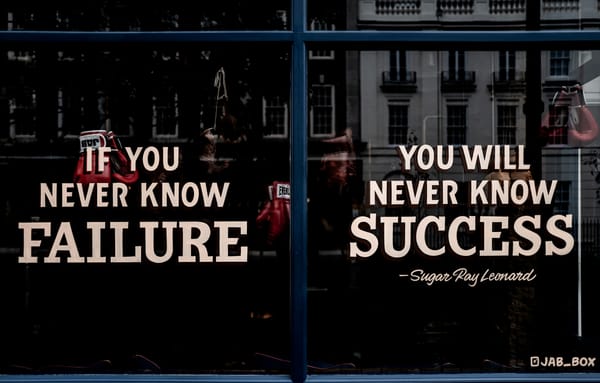Ikigai — a reason to live
Discover your life's purpose with Ikigai! Learn how to combine passions and skills for a fulfilling journey. Unlock your reason to live today!

Podcast version of this article generated by Google NotebookLM, it may contain errors
I wrote about different approaches to choosing a life’s work. I suggest you compare different options and then combine them into the Japanese concept of "IKIGAI." This concept means a sense of one's own purpose in life, which I have applied in practice twice: once four years ago and the second time two months ago.
If you think that the topic of choosing a life’s work is already clear, then I basically agree with you. But I will try to translate the abstract understanding into a simple form, which will help your brain interact more actively with this information, analyze it, and make decisions.
In other words, it will be easier for you to think and choose what you want to do. The answer to the question of why you should think about this lies in the GALOP and Eurofond surveys, which state that approximately 10-20 percent of people engage in their own business.
Some of my clients found my approach to "IKIGAI" sufficient, but if you are interested and it is not enough for you, there are books dedicated to finding life’s purpose.
Profession
I believe that a profession is when you get paid for what you are good at and do well.
your knowledge and skills → decent pay
This is the most common way of choosing. Obviously, we need money to live. Therefore, we do what we know how to do. We study in school, then go to college because we are used to studying and know that we need a diploma to get a job. Some continue their education in graduate school and receive a doctorate for various reasons: out of habit, fear of starting work because it is unknown, desire, or status, and so on.

Problem
Often, a problem arises: we are good at what we do not like at all. We chose an institute and profession for various reasons - by tarot cards, at the insistence of our parents, because it was the only place we managed to get into, or because it was the only thing we once heard something good about and remembered. As a result, many people become unhappy. Work does not bring pleasure, and life begins only after work - in a bar with friends or with "Netflix and chill", those who know, know. Waiting for the weekends becomes excruciating, just to rest. But if this is not about you - that's wonderful.
Obvious Solution
Acquiring new knowledge and skills.
Training can take place right at the workplace. You can also take special courses or independently gather the necessary information from open sources.
The advantage is that sometimes this can be done very quickly, literally in a couple of months. Nevertheless, some spend up to 5 years on it.
If you have an average salary, then you can part with an unpleasant job in a couple of months. Or you can choose horizontal advancement within your own company.

Example
My acquaintance was a sales manager, earning a good salary and commissions, but he hated his job.
His father's strict upbringing blocked his opportunities, and going to a therapist seemed like a threat to his manhood.
He believed that the lack of higher education doomed him to a lifetime of work in sales.
But we found a solution that matched his values and utilized his sales skills.
He read one book, practiced for three months, and became a bartender, first on a cruise ship, then in Abu Dhabi. He likes it.
But this example does not imply that he will be a bartender for life.
It became an important stage in his life for restoring emotional health, rethinking values, and changing his outlook on life. Perhaps he will realize that this is his calling and will remain a bartender for life, or maybe he will discover something new in himself; the main thing is, he freed himself from constraints.
If you don't have a higher education, it might seem that all roads are closed. If you do, there might be a fear that wherever you go, it will be a waste of time. But in reality, you live in a world where all opportunities are open.
Stress
If you're not living your life, hate your job, or just don't enjoy it, it's quite possible that you're in a constant state of stress without even noticing it.
A little stress is normal; it activates hormones, helps us think better and remember information. It helps us navigate faster and generally not fall into depression.
Many underestimate the impact of chronic stress on their lives
Most people perceive negative emotions and stress from work as something normal and natural. Addressing this issue is seen as a weakness. But in fact, stress can prevent you from becoming the best version of yourself and reduce your physical activity. Your physical fatigue might be caused by stress.
The most comfortable exercise for checking - rest
But you also need to know how to rest. Perhaps I'll write a separate post about this.
To simplify, you need to turn off your brain. Distract yourself from work. Stop thinking.
From experience, if you are severely overloaded, the moment of reboot comes on the 5th-7th day of vacation in the countryside or on the beach.
Provided you completely clear your thoughts of work and other problems.
But with severe depression, this may take much longer.
Vocation
It is worth paying attention to this word because usually, we hear the word "calling" only in the context of such a statement:
— it is his/her Vocation.
I propose the following definition.
(If you have a different opinion, write to me).
What the world needs right now and what the world is willing to pay for

I have only seen one person who chose their life's work based on a calling. And I don't think many people know from childhood what they want to do, never doubt it for a moment, or enjoy their work.
Only a few believe in a calling. The rest think it's not for them.
Eurofound conducts research on job satisfaction and its alignment with life goals and callings. According to my observations of their reports, only a small percentage of people (10-20%) believe their work is their calling, while the majority see work merely as a means of subsistence.
In Spain, general labor market statistics and employment issues, especially among youth, indicate difficulties in finding satisfying work. Spain has one of the highest rates among EU countries of young people who are neither working nor studying (NEET). This, in my opinion, may indicate difficulties in matching job opportunities with personal callings or aspirations. I don't think that many people simply want to do nothing.
Problem
The main problem associated with a calling is that the world demands a lot but is not always ready to pay for it. For example, the world urgently needs to solve the issue of waste recycling, but it is not very willing to pay for it. However, even in such situations, there are exceptions, and there are opportunities to find funding.
Advantage
By solving tasks important to the world, you experience significant satisfaction from the benefits of your work. Thus, at the intersection of global needs and the ability to earn money, you will find what compensates for any difficulties of this work. Because besides money, you receive powerful emotional rewards—gratitude from the world.
Example
In Russia, many volunteer rescuers do not receive any payment for spending days searching for a lost child in a winter forest.
And the owners of the helicopters used in these operations are often businessmen who spend their own money.
This is because the feeling when a person is found and saved is simply unimaginable.
The largest volunteer rescue organization is called LizaAlert.
Possible Solutions
A quick transition is possible even here.
You can work in companies that are involved in fighting hunger or developing clean energy, in any position available to you. Even managing the company's social media can attract millions of rubles in investments.
Age does not matter. For example, many schoolchildren create startups based on their school projects:
One of them created biodegradable plastic, another developed a test for pancreatic cancer (which is 26,000 times cheaper and works 168 times faster), and a third invented a pontoon system for collecting garbage in the ocean.
Common Mistake
For me, the main mistake, which annoys me the most, is a lack of confidence in oneself, and unfortunately, it is very common. Many think that their dream is somewhere far away and, of course, not about them.
THIS IS THE MAIN MISTAKE
It will become about you when you start doing it. At the end of this post, I have described in detail how it works.
Yes, it will be difficult. But it will be difficult, as in any job. Time and repetition will make you a pro at any task.

Although we do not have studies that examine how self-distrust can ruin your life, there are studies that prove the opposite.
According to Albert Bandura's self-efficacy theory, people who believe in their abilities are more likely to take on challenges and persist in tackling them. This, in turn, leads to higher achievements in various areas of life.
Students who are confident in their ability to successfully handle academic tasks achieve greater success, as shown in a randomized controlled study.
Mission
A combination that brings a lot of psycho-emotional satisfaction.
what you love → what the world needs now

Problem
The main problem with this approach is that in the real world these two components tend to diverge, breaking the connection.
To ease this task, let's assume that the intersection exists, but it needs to be strengthened.

Solution
CREATE DEMAND
Example:
There was a man who created unusual toys. All of them were made in one style but were different. While there were many other toys, his toys didn't particularly stand out.
However, he decided to sell them in closed boxes. The buyer could only find out which toy was inside by purchasing it.
He became wealthy by adding additional value to an ordinary piece of plastic.

Adapt
Here is my example: I have a very wide range of interests. I love learning and discovering new things, even though it's unpaid.
After a successful career in the restaurant business, marketing, design, and working as a product manager, I started practicing coaching in parallel. My passion for knowledge and new things helps me offer people possible solutions to their problems.
Now I have decided to create media to share with people what interests me to learn. However, I am currently devoting very little time to this, as I am in a new country and starting from scratch. I spend all my free time studying data analysis, Python and SQL, English and Spanish to first secure a comfortable workplace for myself. And only when my brain is no longer able to learn, do I devote time to my media platform.

Create a new meaning
The world doesn't always know what it wants. Sometimes the world needs to be offered something. Starting from a conceptual restaurant in a residential area with simple and inexpensive food that will be at home for dinner or you will take it to work in the morning.
Ending with Steve Jobs and the iPhone.

Self-Coaching
If you're interested, you can start self-coaching. It's especially useful if you want more out of life or if you have thoughts about various interesting directions but can't decide.
Here's what you should do:
When you have time and find yourself in a cozy environment (calm and relaxed), write down what you like, what you're good at, and what the world might need from you.
Don't strive to complete this task perfectly or logically. Just start, then leave it and come back when you feel inspired.
Do it for yourself
- Do this exercise for yourself.
- Don't try to squeeze everything out of your brain.
- If you're tired, take a break, but always keep a sheet of paper or a notebook handy.
- Sometimes inspiration comes at the most unexpected moments: while doing the dishes, going to the movies, or during a stressful moment at work. So ensure quick access to your phone, notebook, or a sheet of paper so you can quickly jot down your thoughts and not lose them.
Just start, everything will follow.
Passion
a rare and poor beast %)
It's a good thing that is rarely found in its pure form. Therefore, it fits well into the "ikigai" model. But right now, we're talking about passion. In my understanding, it is the following:
what you love → what you're good at

Problem
People are usually put off by low pay, and therefore often end up in other categories I mentioned earlier. But let's apply a bit of cognitive-behavioral therapy and look at this with a specific example.

You have a passion for something that doesn't pay, but your current job pays well
If you have no desire to work, consider changing jobs.
If a high salary is important to you for specific reasons, and not out of fear, then start finding pleasure in the little things or create them yourself. Focus your attention on the quality of life. Be grateful for what you have at your job. If there are few such moments, then why do you need a high-paying job if your quality of life is far from ideal? Many forget about this and skimp on themselves. To do this, shift your attention to self-care and the outside world.
This won't give your life a sacred meaning, but it will create a beautiful picture and mood.
Incorporate moments of quality life into your work routine. For example, I had lunch with a glass of wine and Georgian cuisine. I turned off my phone, had lunch, and read the book "A Year in Provence."
This reminds me of the broken windows theory.
This criminological theory states that if you fight minor offenses, major ones will disappear. In the New York subway, they started fining and punishing for graffiti and fare evasion, which led to a reduction in more serious crimes.
Improve small imperfections in your environment, create pleasures, and your mindset will begin to change.
And the following transformational changes will happen easily and without tension.
I understand that it's fashionable now to be efficient, save the world, and so on. But enjoying life and living for yourself is not shameful. You don't have to search for the meaning of life. You can just live and want nothing.
How to Follow Your Passion and Earn Well
Everything, as in other cases, is very individual. But I have the following advice for you:
Create a strong personal brand.
For example, you might think it's impossible to work as a teacher because of the low salary, but you feel that it is your calling.
Make yourself known to the world. Show how, thanks to you, children become interested, how their knowledge of the subject and interest in the world grow stronger. And parents won't have to force their children to study.
Create lessons for platforms like Skillshare, YouTube, etc.
With this strategy, your salary will be more than decent, and you can work at a better school or open a private practice.
IKIGAI
In Japanese, it is two words. And I have encountered different translations:
— the art of living;
— the meaning of life.

Start with a list of preferences
Make a list of what you like to do. Then, list what you might like.

Continue by adding competencies
Now list what you already do well and what you can do well.

Where "I can do well" — mark the number of hours spent on learning and acquiring skills.
Next, move on to the topic of money
Now describe your approximate income, growth potential, and compare this with the costs of education. However, do not rush to exclude anything. There are still many opportunities ahead to bring benefits to the world, which brings great satisfaction.

Finish with a benefit for the world
Note how much satisfaction you will get from each task.
However, do not blindly trust numbers, emojis, and empty points.
There is a bit of objectivity and a lot of subjectivity present here.

What to do with the plan
Leave it. Take a walk. Get some sleep. Set it aside for a couple of days. Or until the new year. Or add to it tomorrow.
When you're ready, put it on the wall. Use sticky notes. And work on it whenever you feel the urge and inspiration.
Or draw it on a poster board. Or create a mind map. Do it however you like best.
MAIN MANTRA:
Don't force yourself and don't pressure yourself regarding this plan. It has no deadline. Work on it when you know what to do and when you have the inspiration. It’s a helper, not a threat or a "Sword of Damocles" hanging over you.
Smile and enjoy the process.
What's next
Reach out to friends who are interested in your success.
To parents who love you more than themselves.
To me or another coach.
The main thing is to find someone who will genuinely be interested in you and will guide and support you.
Don't strive to be a superhuman.
Become a better version of yourself every day.
At your own pace.
And I want to write about a pseudo-scientific theory.
For example, the concept of the "10,000-hour rule," popularized by Malcolm Gladwell, suggests that to achieve mastery in any field, a person needs to dedicate a significant amount of time to practice.
But I can rephrase it differently. If you didn't dream of becoming a firefighter, pianist, or surgeon from childhood and knew exactly what you wanted to do and are now doing it, of course, this post is not about you. It is about those who make up the majority, who don't know what to do and what to choose. Here's the thing. You are waiting for a miracle, but it won't happen. A miracle is when you expect a brilliant idea to come to your mind about what you want to do, and it will be yours. But that won't happen.
It's much simpler and more prosaic. And for this, you don't need inspiration or motivation. Only discipline. It's a journey of about 5 years. If today you choose something for yourself according to the ikigai system, which more or less satisfies you, and start working on it for 5 years, then by that time it will become yours.
It all starts with the euphoria of a new endeavor. Then you will face difficulties and find yourself in the plateau of despair, where everything will be difficult and unclear, and there will be many new and interesting things around, and you will want to try this new stuff. But it's a deception; with new things, it will be the same.
Then you will have to work long and hard. When people start praising you, you will need to change jobs, where you will again start receiving corrective feedback, and so gradually.
Coming out of the plateau of despair, it will first become not so hard, then normal, then not bad, then interesting.
And then, after 5 years, you will say: "This is about me, this is who I am." Yes, I know little about the field in which I have achieved so much, but I am one of the hundred who knows just as little, but above us, there is no one, and we, although we know nothing, understand it better than anyone else.
That's the only way.
Good luck.
You will succeed, and even more.




